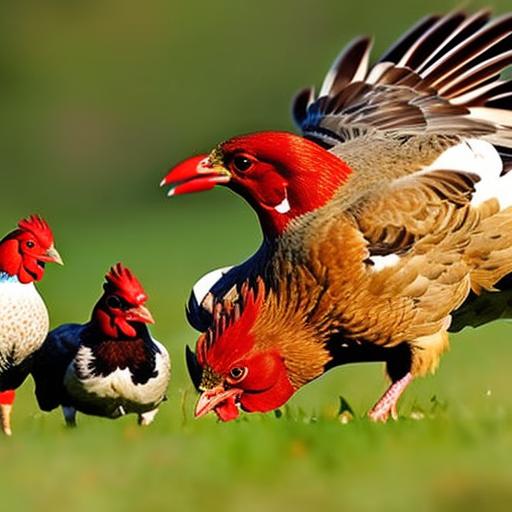Backyard chickens have become increasingly popular in recent years, as more people are embracing the idea of sustainable living and enjoying the benefits of fresh eggs. However, one of the biggest threats to a backyard flock comes from an unexpected source – dogs. Dogs are natural predators and can pose a serious threat to chickens if not properly managed. Understanding the risks and taking preventative measures can help keep your flock safe and ensure their well-being.
Key Takeaways
- Dog attacks on chickens are a serious threat to backyard flocks.
- Assessing your property and identifying potential risk areas is crucial in preventing dog attacks.
- Choosing the right breeds of dogs that are safe around chickens can help prevent attacks.
- Training your dog to coexist with chickens and building secure coops and runs are important steps in protecting your flock.
- Installing fencing, using deterrents, supervising outdoor time, and knowing how to respond to attacks are all necessary for ensuring the safety and well-being of your chickens.
Assessing Your Property: Identifying Potential Risk Areas
The first step in protecting your chickens from dog attacks is to assess your property and identify potential risk areas. Take a walk around your property and look for any areas where dogs could potentially access your chickens. Look for gaps in fencing, low-hanging branches that could provide a jumping-off point, and any other potential entry points. It’s important to be thorough in this process, as even the smallest gap or hole can be an invitation for a curious or predatory dog.
Choosing the Right Breeds: Dogs That Are Safe Around Chickens
Not all dog breeds are created equal when it comes to coexisting peacefully with chickens. Some breeds have a higher prey drive and may see chickens as potential targets. On the other hand, there are breeds that have been historically bred to guard livestock and are more likely to protect rather than harm chickens. Breeds like Great Pyrenees, Anatolian Shepherds, and Australian Cattle Dogs are known for their ability to coexist peacefully with chickens. If you already have a dog and are considering adding chickens to your backyard, it’s important to assess their temperament and trainability before making a decision.
Training Your Dog: Teaching Your Canine Companion to Coexist with Chickens
| Training Your Dog: Teaching Your Canine Companion to Coexist with Chickens | |
|---|---|
| Number of chickens in the flock | 10 |
| Number of dogs in the household | 1 |
| Training duration | 6 weeks |
| Training frequency | 3 times a week |
| Training method | Positive reinforcement |
| Training success rate | 90% |
| Number of chicken fatalities during training | 0 |
Proper training is essential in teaching your dog to coexist peacefully with chickens. Start with basic obedience training, teaching your dog commands like “sit,” “stay,” and “leave it.” Gradually introduce your dog to your chickens, using positive reinforcement to reward calm and non-aggressive behavior. It’s important to closely supervise these interactions and intervene if necessary. Consistency is key in training, so make sure to reinforce the desired behavior consistently over time.
Building Secure Coops and Runs: Creating Safe Spaces for Your Flock
A secure coop and run are essential in keeping your chickens safe from predators, including dogs. Use sturdy materials when building your coop and make sure there are no gaps or holes where dogs could enter. Consider reinforcing the bottom of the coop with hardware cloth to prevent digging. Additionally, make sure the coop is elevated off the ground to discourage dogs from trying to access it. The run should also be securely fenced, with a roof or netting to prevent dogs from jumping over.
Installing Fencing: Keeping Dogs Out of Your Chicken Area

Fencing can be an effective way to keep dogs away from your chickens. Use a sturdy, tall fence that is at least six feet high to prevent dogs from jumping over. Consider adding an electric wire at the top of the fence for added protection. Electric fences can be an effective deterrent for dogs, as they quickly learn to associate the fence with an unpleasant shock. Make sure to follow local regulations regarding electric fences and ensure that they are installed safely.
Using Deterrents: Scaring Off Unwanted Canine Visitors
There are several deterrents you can use to keep dogs away from your chickens. Motion-activated sprinklers can startle dogs and discourage them from approaching your flock. Noise makers, such as air horns or ultrasonic devices, can also be effective in scaring off unwanted canine visitors. Another option is to have a guard dog of your own that is trained to protect your chickens. However, it’s important to note that not all dogs are suitable for this role, and proper training is essential.
Supervising Outdoor Time: Keeping a Watchful Eye on Your Chickens
Supervising your chickens when they are outside is crucial in preventing dog attacks. Keep a watchful eye on your flock and be aware of any dogs that may be in the area. If you see a dog approaching, intervene immediately to prevent any potential harm to your chickens. It’s also important to supervise any interactions between your dog and chickens, especially if your dog is still in the training phase. Never leave your dog unsupervised with your chickens until you are confident in their ability to coexist peacefully.
Responding to Attacks: Knowing What to Do in Case of a Dog Attack
Despite your best efforts, a dog attack may still occur. It’s important to have a plan in place for how to respond in case of an attack. First and foremost, ensure the safety of yourself and any other humans present. Contact animal control immediately to report the incident and seek medical attention for your chickens. It’s important to document any injuries or damages caused by the dog for legal purposes. Take steps to reinforce the security of your coop and run to prevent future attacks.
Ensuring the Safety and Well-Being of Your Chickens
In conclusion, protecting your chickens from dog attacks requires a combination of preventative measures and proactive management. By assessing your property, choosing the right breeds, training your dog, building secure coops and runs, installing fencing, using deterrents, supervising outdoor time, and knowing how to respond in case of an attack, you can help ensure the safety and well-being of your flock. Remember that the safety of your chickens should always be a top priority, and taking these steps can help provide them with a secure and happy environment.
If you’re a chicken owner with dogs, you may be concerned about how to keep your dogs from killing your chickens. It’s a common problem that many poultry enthusiasts face. Fortunately, there are several strategies you can implement to ensure the safety of your feathered friends. One important aspect is providing a secure and appropriately sized chicken coop. To learn more about how big a coop needs to be for chickens, check out this informative article on Poultry Wizard. By following the tips and advice provided, you can create a safe environment for both your dogs and chickens to coexist peacefully.
FAQs
What are the reasons why dogs kill chickens?
Dogs may kill chickens due to their natural hunting instincts, boredom, lack of training, or lack of supervision.
How can I prevent my dog from killing chickens?
You can prevent your dog from killing chickens by training them to obey commands, providing them with enough exercise and mental stimulation, supervising them when they are around chickens, and using physical barriers such as fences or chicken coops.
What breeds of dogs are more likely to kill chickens?
Breeds that are known for their hunting instincts, such as terriers, hounds, and retrievers, are more likely to kill chickens. However, any breed of dog can potentially kill chickens if they are not properly trained and supervised.
What should I do if my dog has already killed chickens?
If your dog has already killed chickens, you should separate them from the chickens and seek professional help from a dog trainer or behaviorist. You may also need to use physical barriers to prevent future incidents.
Can I train my dog to not kill chickens?
Yes, you can train your dog to not kill chickens by using positive reinforcement techniques such as rewarding them for good behavior around chickens and teaching them commands such as “leave it” or “stay.” However, training may take time and consistency.
Meet Walter, the feathered-friend fanatic of Florida! Nestled in the sunshine state, Walter struts through life with his feathered companions, clucking his way to happiness. With a coop that’s fancier than a five-star hotel, he’s the Don Juan of the chicken world. When he’s not teaching his hens to do the cha-cha, you’ll find him in a heated debate with his prized rooster, Sir Clucks-a-Lot. Walter’s poultry passion is no yolk; he’s the sunny-side-up guy you never knew you needed in your flock of friends!







